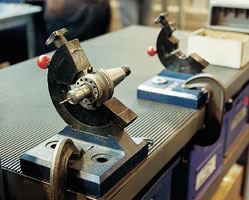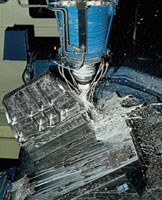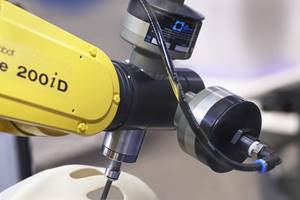Bringing Toolholders Up To Speed
For the Wichita, Kansas, division of aircraft manufacturer Boeing, one aspect of effective high speed machining is finding the right balance. The division machines aluminum at speeds ranging from 15,000 to 40,000 rpm. To cut at these high speeds as effectively as possible, Boeing uses both pre-balanced and balanceable toolholders.
Share





For the Wichita, Kansas, division of aircraft manufacturer Boeing, one aspect of effective high speed machining is finding the right balance. The division machines aluminum at speeds ranging from 15,000 to 40,000 rpm. To cut at these high speeds as effectively as possible, Boeing uses both pre-balanced and balanceable toolholders.
Pre-balanced toolholders are manufactured to a particular balance level up to a particular speed and are only balanced by the end user with the removal of metal from the toolholder. Although more economical, this method can be limited, inconsistent and not easily performed. With ever-increasing spindle speeds, the overall balance of the toolholder, cutting tool and retention stud assembly become more crucial.
Balanceable toolholders are also manufactured to a particular balance level up to a particular speed. They feature an adjustment system that allows for re-balancing without metal removal. Through the use of a toolholder balancing system, these toolholders can be re-balanced according to the customer's tight tolerances.
Boeing Wichita was doing OK with the toolholders it was using but wanted to run more effectively at high speeds. So Boeing decided to invest in products from Lyndex Corp. (Northbrook, Illinois) through Manufacturing Tools and Supplies. Among the products were the company's "HSBalance" balanceable toolholders. A series of drilled and tapped holes that is parallel to the centerline of the toolholder allows screws and weights to be added or removed to compensate for imbalance in the tool and to fine-tune precision balance. Because of the positioning of the adjustment holes, the screws are not subject to centrifugal force. "Our technique results in a holder that's as close to absolute balance as possible," says Frank Fullone, vice president/general manager, Lyndex.
Along with improving productivity, the use of a balanceable toolholder balanced to the appropriate specifications during high speed machining can decrease chatter and vibration, positively affecting the life of the spindle, the life of the cutting tool and the surface finish. "High speed machining and balanceable toolholders are a necessary combination," Mr. Fullone continues. "Particular accuracies and finishes are not achievable with a standard toolholder."
Boeing's Wichita division specializes in manufacturing 737 airplanes. To produce these planes, Boeing now uses thousands of Lyndex products—about 75 percent of its offering—including standard CAT 40 adapters, HSK adapters and BT tapers, milling chucks, and some right angle heads. Along with high speed, Boeing's applications also require long gauge length toolholders, sometimes up to 14 inches, used for Boeing's deep pocket work.
"We use Lyndex in just about every application you can think of," says Larry McAdow, equipment engineer of Boeing Wichita. In a toolholder, Boeing experts look for taper quality, balance quality and longevity. "Lyndex consistently meets our criteria," Mr. McAdow says.
"Adapters are like perishable tools for Boeing...at the end of two years they replace them," explains Lee Ward, distributor for Manufacturing Tools and Supplies.
Over half of Boeing's orders from Lyndex are custom. Boeing provides dimensions and puts in a request to Lyndex. Lyndex then notifies the end-user if functional or safety issues arise. If the request can be met, drawings are supplied within a week. Boeing then reviews the blueprint to confirm that it meets gauge length and tolerance requirements. Upon approval, the order is processed and the product is delivered.
"Today applications are more specialized, so customers depend on technical support," says Mr. Ward. "If Lyndex offers something that doesn't meet Boeing requirements, they're good at changing the configuration."
Related Content
How to Accelerate Robotic Deburring & Automated Material Removal
Pairing automation with air-driven motors that push cutting tool speeds up to 65,000 RPM with no duty cycle can dramatically improve throughput and improve finishing.
Read MoreRead Next
Setting Up the Building Blocks for a Digital Factory
Woodward Inc. spent over a year developing an API to connect machines to its digital factory. Caron Engineering’s MiConnect has cut most of this process while also granting the shop greater access to machine information.
Read More5 Rules of Thumb for Buying CNC Machine Tools
Use these tips to carefully plan your machine tool purchases and to avoid regretting your decision later.
Read MoreBuilding Out a Foundation for Student Machinists
Autodesk and Haas have teamed up to produce an introductory course for students that covers the basics of CAD, CAM and CNC while providing them with a portfolio part.
Read More

















.jpg;maxWidth=300;quality=90)














